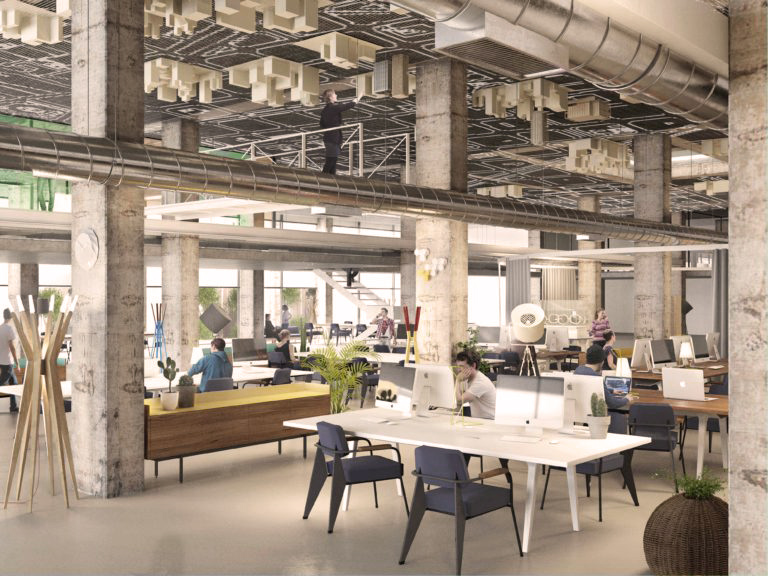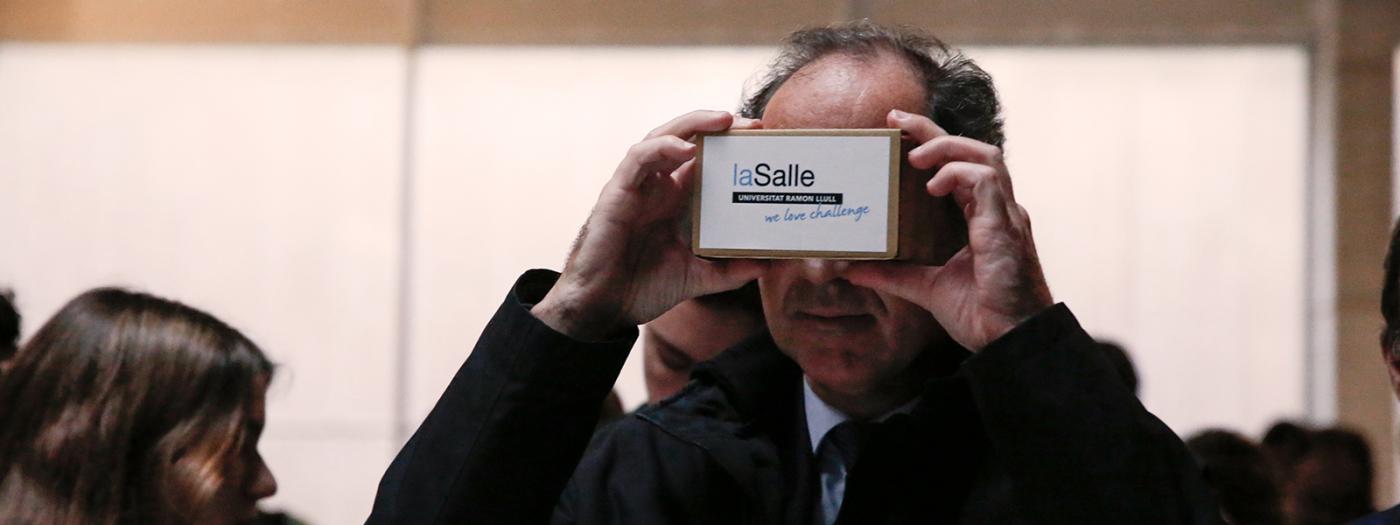It is going to be the first European I+D laboratory to focus on the Internet of Things and its evolution towards the Internet of the future, and is expected to be operational by 2020. The act marked the beginning of the construction of the facilities and of the transformation of a 2.000 m ² space in the La Salle-URL Campus.
The Institute has been co-financed by the ERDF (European Regional Development Fund) under the framework of singular institutional projects in I+D infrastructures in the generation of excellent research, the attraction of talent and the development of knowledge transfer activities. The project was selected and granted to La Salle-URL by the Department of Business and Knowledge of the Government of Catalonia in April 2016. The total cost of the rehabilitation is 3 million euros over a period of 3 years.

The espace of Internet of Things Institute of Catalonia
The new space will foment the creation of an internal eco-system creating innovation, transfer and research in which joint collaboration projects with companies, entrepreneurs, students and campus staff can be undertaken. All these agents will work together to develop ideas which will shape the future, in a space where talent and research come together with society and business, and where we will capitalize on the student talent from our different faculties.
The Institute is strongly committed to the Catalan innovation eco-system and is aligned with the RIS3CAT, the intelligent research and innovation strategy in Catalonia which aims to consolidate the region as one the European leaders in knowledge and connecting technological and creative capacities in new and emerging sectors and regions.
The laboratory of technological base
The Institute will represent the commitment of La Salle to entrepreneurship and to innovation and will be the centre where projects will be developed on anything related to the interaction of people with social trends and surrounding technology, with a strong focus on the Internet of Things, as well as the Internet of the Future. The space is based on design, proto-typing and scaling the products and services of tomorrow to society and the business world, as well as taking students and professors to the new realities and needs of future society.
The 2.000 m ² space will be dedicated to research, innovation and the promotion of talent and entrepreneurship. The first phase will house our internal researchers in specialized laboratories.
Over the past 20 years, La Salle-URL has adapted to, focused on, and strengthened its I+D+I and now has 6 research groups which together form La Salle R&R, acknowledged by the ACC10 as a Technology Centre which undertakes over 70 projects per year in which over 80 researchers participate. These projects may be international, national or regional and be funded either publically or privately.
A unique space of 2.000 m²
The space will be a completely unique area located on the ground floor of the Campus Residence. It has been designed by the Terradas Arquitectos studio, led by Robert Terradas, director of the La Salle-URL Architecture School. The design creates a rich creative atmosphere and is modelled on other internationally renowned research centres.
The laboratory will have 4 different areas:
- A common social meeting point where people can debate, show and even try out any idea which has been conceived during the innovation process. Ideas can later be tried out in the design and testing processes.
- Creativity Room: spaces designated to fomenting creativity and information exchanges and where challenges are born into a creative and imaginative environment. It can be used for structured activities, but also to facilitate an idea flow which can be used to set off new innovation and research processes.
- Maker Space: workspace designed to provide tools to develop projects for the group of researchers from the areas of Architecture, Management and Engineering, together with designers, inventors and entrepreneurs. The objective of this area is to promote the participative development, facilitate the interdisciplinary learning and optimize co-creation activities. In terms of design, the laboratories are completely open-plan and a space to think, try out and test ideas and prototypes.
- City Lab: Space for the assembly and testing of technologies which are developed. It is the showroom where the final products of projects are displayed. An open space where different types of projects will be displayed and rated by others. An open space where different projects will be carried out and prototypes in a controlled setting.
A new methodology: Learning by Challenge
A multidisciplinary team with a great variety of diverse profiles will work together at the laboratory: researchers, companies, entrepreneurs, students, professors, etc.
The Institute will strengthen the La Salle-URL learning style, which has advocated the Learning-by-Doing methodology for many years now, by developing a new methodology, Learning by Challenge, which promotes learning through overcoming challenges and which is now being used all over our campus. This new laboratory will enable students to go further than case-studies, using new research and transfer techniques, with systemized processes to face tomorrow’s challenges.
Transfer to the business network
La Salle-URL aims to take advantage of the fact that we have companies which are working in this area and involve them in the generation of projects and challenges at the laboratory. One of the objectives is to facilitate the integration of the business network into our systemized process of innovation and technology transfer. Anyone can participate, from entrepreneurs, SMBs, large companies to local, national or international research centre.
This project is the final link in the strategic process to align the I+D+i carried out by the University with the needs of the business network and aims to bridge the gap between the Company and the University, by creating the knowledge transfer flow needed to improve the quality of life of our society.
